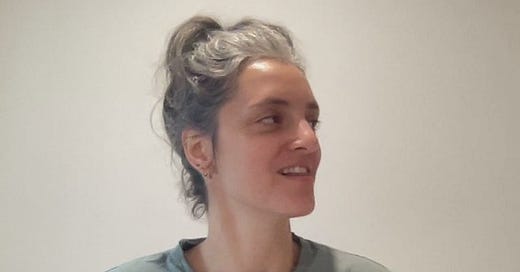Below is the written version of the video above. As above, so below.
Today I'm writing about my “good cop, bad cop” approach to emotions. Working with my interiority like this really tickles me, and I wanted to share it with you.
The basic idea: you can play good cop by accepting and allowing your feelings so that you stop being afraid of them, and you can play bad cop by noticing that your feelings are coming from crappy stories you’re telling about yourself and the world. These strategies are both useful, but in different situations.
Here’s when the good cop comes in handy. Sometimes we're having feelings and in a subtle way we're trying to push them away. For me, the act of pushing away feelings often shows up as frustration, apathy, or being bristly or prickly - pushing people away.
When I start to feel any of these, I have the suspicion that there's another level that I’m not quite aware of yet. On this other level, I’m likely feeling vulnerable or sensitive, like there's something that wants to be held really gently. The frustration, apathy, or prickliness shows if I am not holding it gently. Holding it gently means being kind to myself and accepting whatever I am feeling with compassion. It may also mean changing my surroundings, for example, if I am in a very noisy or bustling environment, finding a quieter setting. It may mean exiting a conversation that is not supporting the revelation of this deeper feeling.
When I’m avoiding deeper, sensitive feelings, and there aren’t any immediate tasks that need to be done, the best thing I can do is take a deep breath and be the good cop. The good cop is understanding. The good cop is encouraging. The good cop is validating. In this way, I really allow the deeper layer of feeling to arise. I let myself sink down into it.
This happened earlier this week. I was feeling SO frustrated. Everything felt like it was going wrong, and I was getting very emotionally worked up about things “not being right”. When I finally sat down with myself to figure out what was going on inside, I discovered this really, really delicate, squishy, soft vulnerability underneath that pile of frustration. The frustration was fending against feeling the vulnerability. I sat there and allowed myself to feel and touch and be with and encourage and accept and allow that sense of vulnerability, and really say, I welcome this feeling. To be gentle, to actually be sensitive to it.
That's the good cop. In this situation, it was a wonderful move. I encountered a level of vulnerability I hadn’t felt before. It was a profound acceptance of my own emotionality to be in contact with that depth of my own shaky vulnerability. I want to endorse that. Find out what delicate or scary emotions you’re afraid to bring forth! Give yourself room to be vulnerable, angry, or whatever you didn't get to feel or express in the past. It’s great to loosen our sense of expression, and to learn to bring all of our emotions into relationality in appropriate ways. I've learned over time that it's really important to be able to be the good cop. Making the good cop move is really, really important so that your deepest fears and desires aren’t repressed out of existence your whole life. The good cop move helps open up the “I have feelings and that’s okay” shop.
“It was a profound acceptance of my own emotionality to be in contact with that depth of my own shaky vulnerability.”
But I love being the bad cop. For me, it’s like an ice cream parlor. The bad cop says, “You have a story that you’re bound to fail. But that’s crap. That’s a horrible story and it’s not even true. You should stop that immediately.” And when I hear that, there is this world of possibility that opens within me, because I thought those stories were true. I thought I was inadequate. I thought I was bound to fail. When the bad cop steps in, it becomes obvious that those stories are not worth telling. My “woe is me” identity is exposed as a functional sham.
I’ll give an example from two minutes before I started writing this – it was the inspiration for this piece. The lie (story) that I was telling myself was “Uh, I can't do this.” I was trying to write something and I kept having this mess of thought-feeling-belief-meaning that boils down to “I can't do this and I feel like shit when I try.” The good cop would basically be like “Oh, it's okay. Feel the delicate feeling. Be with yourself as you feel your feelings. Be kind to yourself as you feel.” I kept trying to do that and it wasn't fucking working. It just wasn't working.
That's when I had the idea for the bad cop. The bad cop was literally like, stop lying to yourself. That story is crap. That story is terrible. That story is a lie. Saying you can't do this is a lie. You are telling yourself a story that you can't do this for some reason. There is a reason, you know, maybe to keep yourself from doing it. But that story is not true. You can just let go of that story. You can just mic drop that story and be over with it.
“You can just mic drop that story and be over with it.”
And I was like, glory hallelujah. I felt this huge rush of energy that I could just drop that story and stop pretending like it was true — because it's clearly not. I have so much evidence to demonstrate that I can do exactly what I'm trying to do right now, that I can absolutely write that thing I was trying to write. And this is the glory of the bad cop. The glory of the bad cop is the bad cop doesn't believe any of the limiting stories that you're believing. The bad cop does not buy any of the ways that you are avoiding using your own capacity.
So that's good cop, bad cop. I think most people prefer the good cop. I think I'm an anomaly — but if you also like bad cop, let me know. To me, the real beauty is in finding the balance between the good cop validation that allows us to feel the deeper feelings that are often controlling our lives, and the bad cop mic drop that bashes the stories that are keeping us from living better lives. It's a killer combo, y'all.
If you’d like to support this work, there are many ways to do so. You can work with me in groups or one-on-one; you can contribute to my patreon; you can talk to your friends about relational work; you can forward these posts; you can comment on this post or message me with your own experiences, reflections, questions, and ideas. Are there things you’d like me to write about? Let me know. And subscribe below!












Share this post